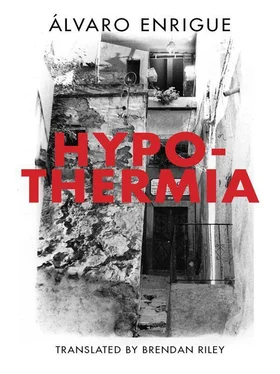Then the war began. Probably angry because the priest, until he found a different singer, preferred to conduct the ceremony solely with organ music, the baritone began to use his whole voice — trained in who knows what conservatory to fill theaters of Soviet dimensions — with the goal of blowing away the other worshipers who, sparse and timid, tried to follow the organist in their blue psalm books. On the two Sundays that it took the priest to place a substitute on the riser, the Pole launched the same string of provocations. He opened by intoning the antiphon at a barbarous volume that he only increased following the Gloria. By the offertory he had become the lord of all the air in the church, such that he raised or lowered his tone just enough to throw the priest off course — even with a microphone clipped to his cassock, the priest had a very hard time competing with him.
When the moment arrived to exchange the sign of peace, the priest and the congregation had already surrendered, so that the last man standing was the organist, who was also the toughest nut to crack. The baritone’s strategy, nevertheless, was infallible. He faithfully followed the keyboard’s tempo up to the point when he felt that he could flatten it, then unleashed the full power of his voice box, and once he had the melody in his pocket, he slowed or accelerated the time at will. The organist’s bald head glowed red with fury when he discovered — thanks to a slight delay on the parts of the other faithful worshippers — that he had lost control of the music. So that the ceremony wouldn’t lose its solemnity, he had no other remedy but to follow the enemy.
This was the fat man’s moment of glory. Although he and his brood always occupied the front pew on the right-hand side of the nave, they waited until the paterfamilias had won his duel to the death with the organist to stand up and receive Communion. Their approach to the chalice practically stopped the show. The baritone walked slowly behind his wife, bearing the whole rite in his throat, luminous from the effort, and surrounded by his entire retinue of seven children. When his turn came, he cut off his singing, regardless of their place in the psalm, and bowed his head with a sincerely peaceful gesture that he maintained until finishing his prayers. That, in some way, revealed the irreproachably Catholic quality of his mettle: his body, liberated in full triumph over the banality of its earthly battles, was a perfect lesson on the redemptive power of a god supposedly incarnate in human flesh.
When he finished praying, he rose to his feet like a triumphant bullfighter and, before sitting down, gave the congregation a happy look — he supposed they were on his side. The organist received a malevolent smile; although he had already recovered his preeminent position, for the time being, he knew that he’d lost his weekly opportunity to show off his middling flights of virtuosity.
The war of the Polish baritone, he said to her, as if reforming his own front line in preparation for the final assault of the enemy that was the same senseless story he was telling, is the ritual within the ritual found within the walls of Christ the King church. With a certain relief, he heard what sounded like a nasal tone of approval, although it might have just been interference: he usually phoned her from the Starbucks on H Street, two or three blocks from the Bank, to avoid the discomfort of watching her husband walk past while he was trying so hard to make her laugh.
The priest tried various recourses, each time with worse results. He hired a tall old Puritan woman, clean and ugly, hoping that her persistent, piercing high notes would drill through the baritone’s bulk. She was steamrolled during the Kyrie. This woman returned the following Sunday, better armed: the sacristan had set up a microphone for her on the podium, one even better than the priest’s own. When the poor woman began singing the penitential rite, the Pole raised his eyebrows then pulverized her without removing his hands from his pants pockets. The organist’s bald head turned purple as an archbishop’s mantle. After the Puritan woman’s failure there was a very young Jamaican man whose angelic flight through the world was inevitably brought to ground by a flailing plunge from the ethereal heights of the Responsorial Psalm. Then came, in succession, a rosy giant of a man, pink as a pig; the rabid Dominican woman who directed the choir for the Mass in Spanish; and three unflappable Filipino señoras , fearless because they knew no one had any idea what they were singing. Three risers had to be stacked up for them to reach the microphone. It was no use. The Pole continued tyrannizing the Mass with his lungs of steel. Surrounded by his swarming progeny during the slow, majestic procession toward the altar and host, he was the full, vigorous embodiment of Slavic tenacity, destroying tempos and pushing notes to the breaking point.
Then he disappeared. It wasn’t until he said this to her that he really and with clarity saw that he was telling a story with no ending. How? she asked, sounding very intrigued. For a moment this gave him the hope that something real was flowing along those microwaves, same as when they were guided only by the inscrutable, magnetic wisdom of the flesh, with nothing else in between them.
He disappeared, he said, that’s all, nothing else. And? Well, we ended up stuck with the Filipino ladies — they’re frightful. It can’t be. The truth, he answered, is that I really miss him, so much that I went looking for him at Our Lady Queen of Poland. It’s pretty close by. I went to all three morning Masses but there was no sign of him. He disappeared. Maybe he went on vacation, she said. Or he defected to Poland, he responded. Her laughter on the other end of the line made him feel that, in spite of everything, he might be able to save himself.
I have the strange and terrible habit of confessing offenses I haven’t committed.
One day, for example, in my hour of deepest sincerity, beweeping our own incarnation of mankind’s fall from grace, I told her that she had not been my only extramarital affair, that I’d had two other lovers. The number I decided on is of particular interest, because I’d never really had any.
But it would be more interesting still to know why I bother doing this. The fact is that, while confessing to these affairs, I was convinced about the veracity of the events in question. But they made no sense: we’re both adults and we’ve been around the block enough times to be freely admitted to the ranks of the “experienced.” My bragging, therefore, was unnecessary. But that’s what I said to her and now I don’t know how to take it back, because my fictional jadedness isn’t consistent with my fears of our being found out.
It’s something I’ve done ever since I was a kid: I pretend to have a secret life, all to myself. Well, now I’ve got it, all right, and nobody else can get in. I’m like the blind man in the Bible: although his sight was restored, he had to pretend that he couldn’t see anything because Jesus Christ himself ordered it.
No, I don’t even know if what I’m saying here is the truth.
It was by no means a noteworthy event, but it came back to him whenever he allowed himself enough perspective to consider the more practical than admirable scale of values according to which he had always operated, and that had lately, for lack of opportunity, fallen into disuse. During a New Year’s Eve celebration he’d gone out to the garden to have a smoke. He was with his wife and little girls at his father-in-law’s house in Raleigh — a minor, tepid, nondescript city composed almost entirely of suburbs. A fine frozen rain was falling, which in the southern United States can begin at the end of November and not let up until March or April, without ever turning to snow. He had not yet removed his cigarette lighter from his jacket pocket when he spotted an opossum on the garden fence, just above eye level. It was very young, soaking wet, watching him with a hard, unsettling stare.
Читать дальше












